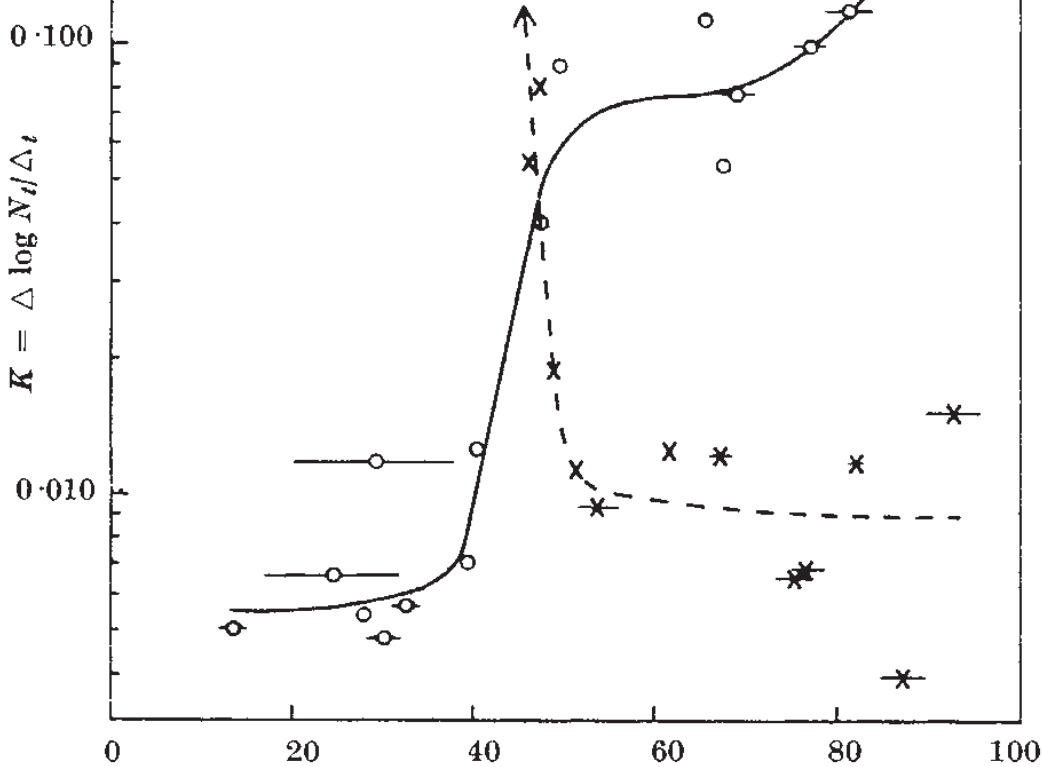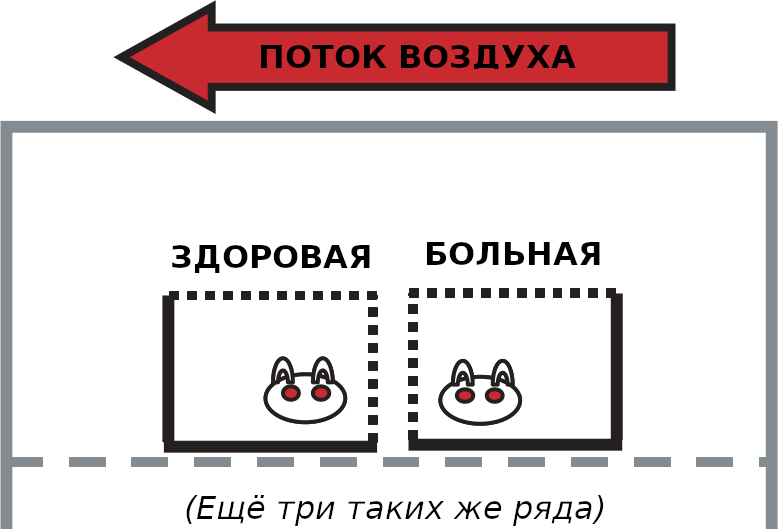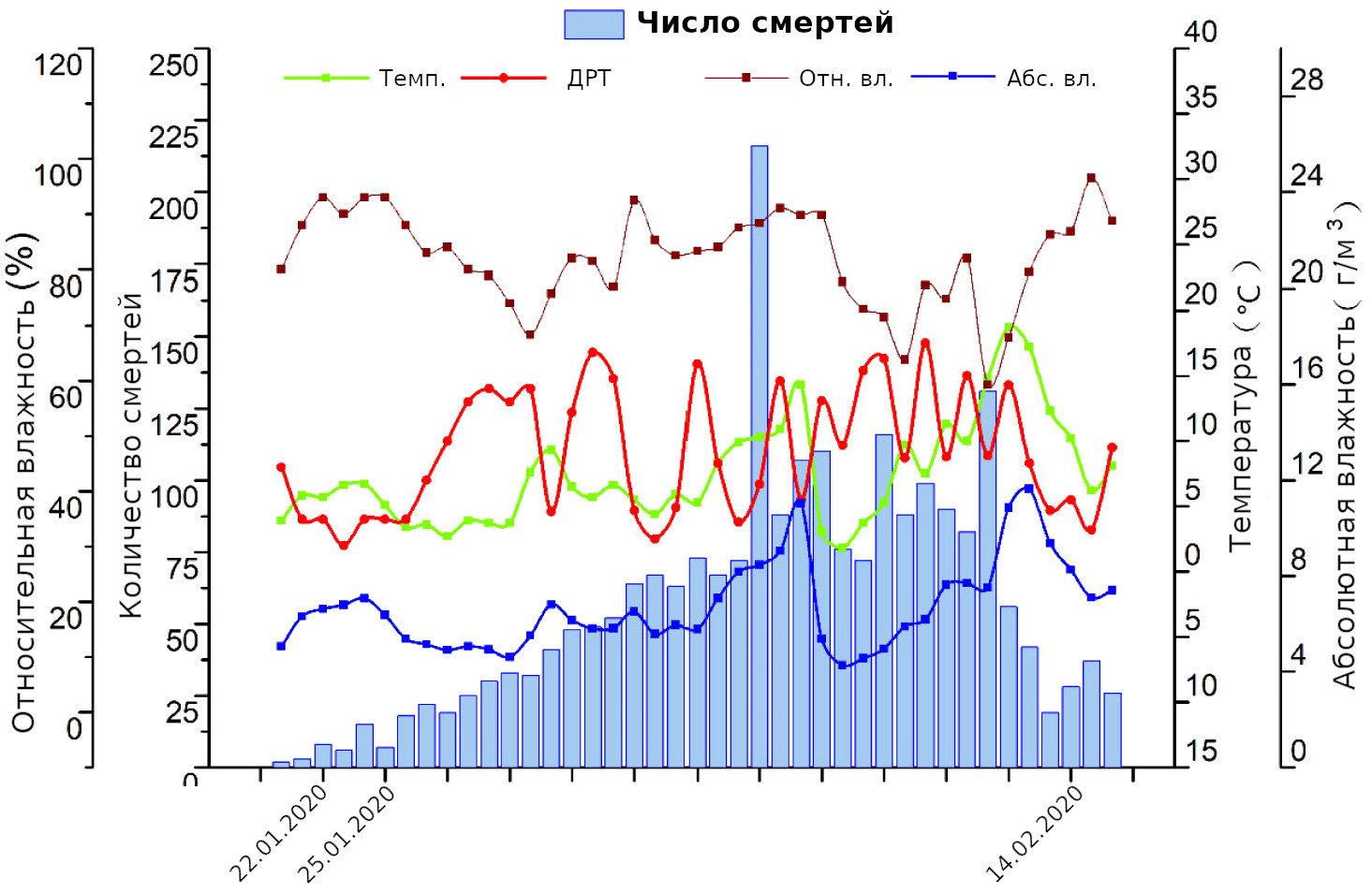Hemmes J.H.等。病毒存活作为流感和脊髓灰质炎的季节性因素,《自然》 1960,188:430-431。
实验表明,流感病毒在低湿度下在空气中持续时间更长,而脊髓灰质炎病毒在高湿度下持续时间更长。这与冬季观察到的流感活动和夏季观察到的脊髓灰质炎活动一致。本文的第一张图以对数刻度显示了流感病毒(\(\ circ \))和脊髓灰质炎病毒(\(\ times \))病毒的灭活(死亡)率,具体取决于相对湿度(以百分比为单位):

Harper G.J.Airborne microorganisms:四种病毒的生存测试,Epidemiology&Infection,1961,59(4):479-486。
, , . . , — . , 64% 24 °C, — 3–4%.
Akers T. G., et al. Airborne stability of simian virus 40 ( SV40 ), Applied microbiology, 1973, 26(2):146–148.
, SV40 ( ). 21 °C ( 22% 88%). 32 °C (50–60%) .
Sohaffer F. L., et al. Survival of Airborne Influenza Virus: Effects of Propagating Host, Relative Humidity, and Composition of Spray Fluids ( : , ), Archives of Virology, 1976, 51(4):263–273.
, , , . , , .
Chew F. T., et al. Seasonal trends of viral respiratory tract infections in the tropics ( ), Epidemiology & Infection, 1998, 121(1):121–128.
1990 1994. - (), . (–) ( , –). , ́ . , . .
Lowen A. C., et al. Influenza Virus Transmission Is Dependent on Relative Humidity and Temperature ( ), PLoS Pathogens, 2007, 3(10):1470–1476.
, ( ) . 20 . 8 :

, , , , 5 °C, 20 °C. 30 °C .
20 °C 20%, 35%, 50%, 65% 80%. 20% 35% ( 3–4 4). 50% . 65% 3 4 , 80% — .
5 °C 50% 80% , 20 °C , .
. -, , . , , 3 . -, ( ). -, , ́ .
Lowen A. C., et al. High Temperature (30 °C) Blocks Aerosol but Not Contact Transmission of Influenza Virus ( (30 °C) , ), Journal of virology, 2008, 82(11):5650–5652.
, , 30 °C 20%, 50%, 65% 80%. .
Shaman J., et al. Absolute humidity modulates influenza survival, transmission, and seasonality ( , ), PNAS, 2009, 106(9):3243–3248
, , . , . , .
, . , . (\(p=0,048\) \(p=0,059\) ), (\(p=0,00027\)).
Shaman J., et al. Absolute Humidity and the Seasonal Onset of Influenza in the Continental United States ( ), PLoS Biology, 2010, 8(2):e1000316.
. , . , .
: , , , — , , , , .
Noti J. D. et al. High Humidity Leads to Loss of Infectious Influenza Virus from Simulated Coughs ( ), PLOS ONE, 2013, 8(2):e57485.
.
, . 4 , . 40% .
Kudo E., et al. Low ambient humidity impairs barrier function and innate resistance against influenza infection ( ), PNAS, 2019, 116(22):10905–10910.
, ( ), , .
Yueling Ma, et al. Effects of temperature variation and humidity on the death of COVID-19 in Wuhan, China ( -19 ), Science of the Total Environment, 2020, 724:138226.
-19 20 29 2020 . () -19:

Yu Wu, et al. Effects of temperature and humidity on the daily new cases and new deaths of COVID-19 in 166 countries ( -19 166 .), The Science of the total environment, 2020, 729:139051.
, . 1 °C 3.08%, 1.19%. 1 — 0,85% 0,51% .
Sajadi M. M., et al. Temperature, Humidity, and Latitude Analysis to Estimate Potential Spread and Seasonality of Coronavirus Disease 2019 (COVID-19) ( , -19), JAMA Network Open, 2020, 3(6):e2011834.
50 10 2020 . 8 -19 42 , -19. , 10 -19 10 2020 .
8 ( , , ́ , , , , , ) 30 ° 40 ° , : 5–11 °C, 4–7 \(\text{/}^3\).
, -19 .
Günther Th., et al. Investigation of a superspreading event preceding the largest meat processing plant-related SARS-Coronavirus 2 outbreak in Germany ( , -19 ), Social Science Research Network, 2020-07-23.
分析了该图,工人的空间布置,气候条件以及通风,运输和居住条件,并对病毒基因组进行了完整分析。发现感染的传播是在一个密闭的房间中进行的,在该房间中空气不断循环并冷却到10°C。该病毒在员工中的传播是在三个工作日内进行的,从其中一个开始。该病毒的传播距离超过8米。所有员工都必须戴口罩并保持距离。